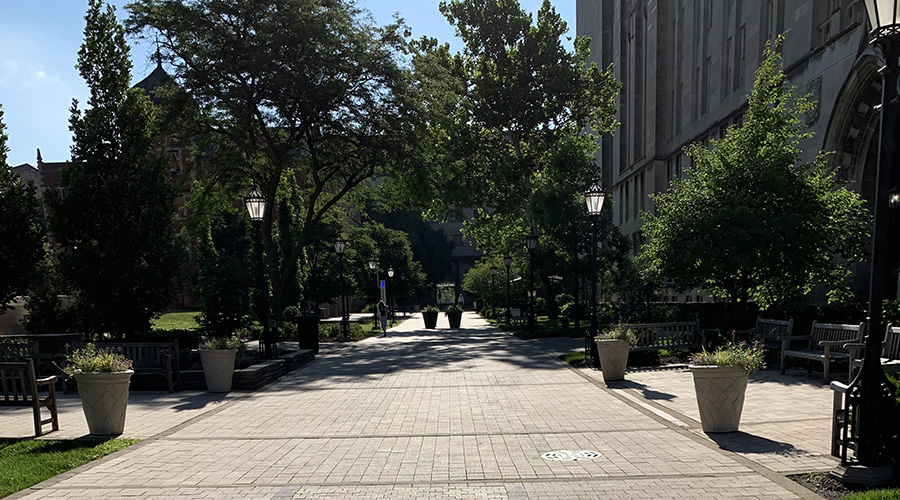6 Considerations for Contracted Security Service
These factors can help ensure the highest level of organizational security.
By Sean A. Ahrens, CPP, and Steve Siegel, Contributing Writers
As facility managers continue contracting security service providers, shifting environmental factors are increasingly changing the larger industry landscape. As facility managers continue contracting security service providers, shifting environmental factors are increasingly changing the larger industry landscape.
Whether internal or external, these factors — including changes across regulatory agencies, competitors, customers, suppliers, legislation, public perception, and more — can have an immediate or protracted effect, impacting organizational performance, operations, or resources.
Understanding the following six key factors and their associated impacts on security staffing is crucial for successfully fostering a productive and lasting partnership among facility owners and contracting agencies.
1. Mergers/acquisitions
Since 2016, Allied Universal Security (AUS) has purchased several large security companies. Recently surpassing industry leader Securitas, AUS is arguably now the largest provider of contracted security services, which has changed the landscape and reduced competition. With these acquisitions, the ability to competitively bid and match contractual performance, such as financial auditing and length of time in business, is more difficult.
Why? Each acquisition has had varied effects. First, mergers typically merge upper management staff via reorganization, and sometimes more experienced staff are terminated. Terminated individuals may start their own companies, but the ability to attract and retain new staff is extremely challenging given ongoing economic trends and the Great Resignation.
Larger firms often have higher budgets related to recruitment activities, allowing them to subcontract diversity, equity, and business inclusion requirements required by many public bids that are not possible with smaller companies starting out. The competitive landscape is getting smaller, with fewer regional and national bidders. Larger contract security companies traditionally are not as customer focused as smaller and regional companies.
2. COVID-19 pandemic
The COVID-19 pandemic has transformed the corporate landscape and how businesses operate. After ushering in new requirements for social distancing, working from home, and vaccinations, this worldwide phenomenon disrupted life as we know it and our ability to meet ongoing business demands. In addition to impacting the availability of potential security personnel, it has created new challenges related to general staff recruiting and retention practices.
3. Workplace Behaviors
One of the biggest issues with contracted security staffing is retention and turnover. Three factors that have created effects on the staffing of security companies include:
- The Great Resignation: Globally, workers have been resigning in large numbers in the wake of COVID-19 for a variety of reasons, which has significantly impacted recruiting efforts, including contracted security.
- Ghosting: Ghosting is where new hires, who have been trained and certified, simply do not show up for their first day. This creates significant issues because on-the-job training is part of that overall process, and contracted security service providers need to keep posts staffed at all times. This has created a need to hire more applicants than typically needed to offset this phenomenon, ultimately incurring additional expenses. Previously, some officers were actively testing for law enforcement opportunities, while some officers, use security positions to do homework, and everything between. Traditional expenses for new hires range from 8-16 hours per person on the lower side. To counter the impacts of ghosting and increased recruiting challenges, additional hires translate to increased training hours and higher upfront costs.
- Older staffing candidates: Given the challenges outlined above, the employment market is seeking older adults, specifically persons 65 years and older, to support these roles. It is crucial that owners review their current training programs and incorporate curriculum updates as needed to effectively accommodate all professional backgrounds.
4. Technology
Security technology is likely the greatest disrupter of contracted security services and the entire security program. Today, we have autonomous drones equipped with machine learning to detect intrusions on large parcels of land that were previously patrolled by security staff. This has reduced staff needs, as human perimeter patrols are no longer needed. Smartphones have nearly replaced printed reports, providing instantaneous incident reports. Cell phones featuring Global Positioning System (GPS)/indoor positioning and high-resolution cameras have further sped up incident reporting and security staff monitoring facility-wide.
Despite the benefits of automated technology, technology can pose new distractions in the workplace. It is important to set clear expectations regarding smartphone usage during work hours — as well as protocols for misconduct, as applicable — early during the hiring process.
Technology is expected to continue to advance. We are getting to a point where autonomous humanoid security staff may replace the observe/report elements of human security staff. One platform that will be supportive of this is bi-ped robots/drones that will communicate via a “hive mind.” Once one robot experiences a hazard/learning experience, it will communicate with other robots to ensure the same mistake is not made again. With an array of customizable and field adaptable sensors, they will use LiDAR, thermal, forward-looking infrared, 5G communications, facial recognition, GPS, and other tools, such as robotic arms and hands, to open doors and right themselves when they fall. These devices can be armed and controlled from a central area and autonomously travel on uneven terrain. Robot “canine” units are also being used to travel up and down stairs.
While still evolving, the one thing that holds these security automations is battery technology. The control, management, and deployment of these devices demands highly educated individuals with demonstrated technical capabilities from existing security staffing pools.
Technology is also affecting current procedures for reusing written documentation and templates that drive security operations, post orders, and training. As security protocols and technologies change, it is critical that clients update their current practices and consider both the advantages and disadvantages of shifting toward digital platforms, such as cloud-based services. Cloud technology provides easy accessibility from hand-held devices, making written protocols living documents that might be updated. As many organizations shift away from printed documentation in favor of digitalization, developing a comprehensive approach for addressing this unfamiliar landscape is paramount.
5. State Laws
State laws have varying effects on security staffing. Some states require licensing while others do not. Typically, the mission of security officers is to observe and report, only intervening when an imminent danger to life is present or failing to act could increase the potential for great bodily harm or danger to oneself or another. In a recent $517 million settlement for the Surfside condominium collapse, a global security services provider observed rushing water, dialed 911, but did not activate the building fire evacuation system prior to the collapse.
Some states are adopting decriminalization efforts. Decriminalization is the reclassification of law so that one perceived criminal behavior is no longer a crime, and typically addressed with a citation. Some states are limiting what they consider offenses. For instance, in Illinois, the SAFE-T Act will go into effect this year. This act removes bail/bond for all offenses and permits pre-trial release. Essentially, this is an individual recognizance bond/promise to appear. More concerning for businesses is that trespassing in 2023 is no longer a crime, and only a citable offense (basically a parking ticket).
In some states, "ban the box" legislature has ensured that a job candidate's qualifications are reviewed first, without the stigma and subconscious bias of a conviction or arrest record.
As some states increase minimum wage rates, it is important to be cognizant of changing legislative requirements and how they might affect your hiring practices and current employees. In alignment with organizational needs, review standard recruiting protocols and determine what adjustments might be needed to ensure employee retention in this changing landscape.
6. Lawsuits
We live in a very litigious society. Negligent security cases are centered on a legal obligation or “duty of care” and are widely publicized, creating challenges related to organizational image and brand. Negligent security can involve large settlements or jury awards. The tragic mass shooting in Las Vegas where 60 concert goers were shot led to a settlement of up to $800 million. Conversely, the brutal murder of a single 83-year-old woman commanded $7 billion by a jury for, in part, not doing a reference or background check on the staff member who committed the murder. As cases involving premises liability continues to increase — and often involve violent crime and/or negligent security — developing a comprehensive approach and well-documented policies and procedures related to organizational security and contracted security staff is absolutely paramount.
Sean A. Ahrens (sahrens@aeieng.com), CPP, FSyl, CSC, is a premises liability expert and a board of directors' member with the International Association of Professional Security Consultants (IAPSC). Ahrens provides security consulting, assessment, and security design solutions that reduce security exposures for domestic and international clientele as a market group leader for Affiliated Engineers, Inc. (AEI).
Steve Siegel (steveadvil@hotmail.com), is a member of and has served on the boards of many security industry associations, including ASIS, IAHSS, ADSAI, CAI, BOMA, IREM, ISPA, MSC and more. He is also a sought-after security industry subject matter expert. )
Related Topics:












